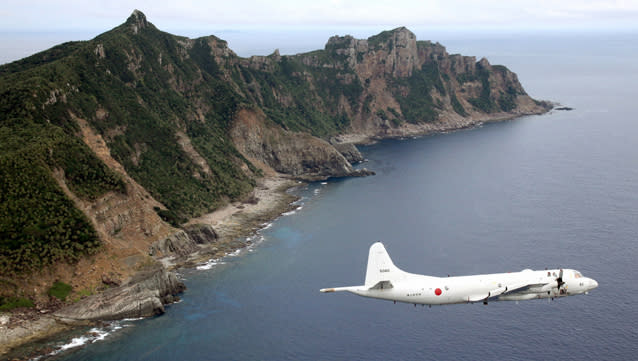Why the Market Isn’t Worried About China’s Saber Rattling

Neither government dysfunction, the sequester, the botched rollout of Obamacare, nor fear of Fed tapering has stopped the market from its appointed rounds with records highs this year. Neither, to date, have escalating tensions in the East and South China Seas.
Last week, the Chinese government took the unprecedented step of declaring its sovereignty over the airspace above the Senkaku Islands, over which Japan claims sovereignty, prompting a robust response from the U.S.
"This unilateral action constitutes an attempt to change the status quo in the East China Sea,” U.S. Secretary of State John Kerry said last week. “Escalatory action will only increase tensions in the region and create risks of an incident."
Tensions haven’t escalated so far, but last Tuesday, the U.S. responded to China’s declaration by sending B-52 bombers into the airspace without informing China while instructing commercial airlines to conform to China's request to register plans to fly into the disputed airspace. On Friday, China scrambled military jets to monitor U.S. surveillance planes and Japanese military planes operating in the area, declaring it "will adopt defensive emergency measures to respond to aircraft that do not cooperate in the identification or refuse to follow the instructions."
Related: America's "State-Run" Economy Just Like China's: The Economist's Easton
Separately, China is continuing to aggressively assert itself in the waters of the South China Sea, one of the world’s busiest trade routes, where it has territorial disputes with Vietnam, the Philippines, Taiwan and Malaysia.
China’s effort to expand its sphere of influence in the region explains why President Obama recently declared America would “pivot” its military focus toward the Pacific. For those who believe the U.S. and China are on a collision course, these developments merely confirm the inevitable.
But as noted above, the financial markets have – so far—collectively shrugged at the rising tensions and potential for conflict between the world’s superpowers.
“This is not exactly the Cuban Missile Crisis,” says Mike Santoli, in explaining the lack of market reaction so far. “It’s an extraordinary assumption of territorial claims [but] nobody really thinks there will be any kind of trade interruption.”
Related: Why America Can Learn From China: In Politics, Competence Matters
Indeed, there has been no interruption of trade or noticeable impact on commodity prices as a result of China’s newly declared 'Air Defense Identification Zone.' Short of that -- or Vice President Joe Biden returning from his trip to the region this week with an alarming report of Chinese belligerence -- it’s unlikely the market will use China’s latest saber rattling as an excuse for a selloff, Santoli says. Furthermore, “We had great bull markets in the 1950s and ‘60s at a time of ‘mutual assured destruction,’ ” he notes.
To be sure, geopolitical issues have a way of not mattering to the markets ‘until they matter’ – especially in this era of uber-easy monetary policy. That said, it’s usually the thing the market isn’t worried about that causes problems in the short term -- so maybe the lack of concern about China’s chest-pounding is itself something to be worried about.
And, by the way, the market doesn’t seem too concerned about anti-government riots that have broken out in Thailand and the Ukraine either.
Aaron Task is the host of The Daily Ticker and Editor-in-Chief of Yahoo! Finance. You can follow him on Twitter at @aarontask or email him at altask@yahoo.com

